-
 Bitcoin
Bitcoin $83,839.5497
-3.61% -
 Ethereum
Ethereum $1,873.9736
-6.35% -
 Tether USDt
Tether USDt $0.9994
-0.04% -
 XRP
XRP $2.1823
-6.61% -
 BNB
BNB $624.3350
-2.37% -
 Solana
Solana $129.2801
-6.38% -
 USDC
USDC $1.0000
0.01% -
 Dogecoin
Dogecoin $0.1801
-4.92% -
 Cardano
Cardano $0.6955
-4.96% -
 TRON
TRON $0.2325
-0.52% -
 Toncoin
Toncoin $3.8189
-1.93% -
 Chainlink
Chainlink $14.0658
-8.73% -
 UNUS SED LEO
UNUS SED LEO $9.7080
-0.58% -
 Stellar
Stellar $0.2712
-4.60% -
 Avalanche
Avalanche $19.8499
-9.60% -
 Sui
Sui $2.5220
-9.03% -
 Shiba Inu
Shiba Inu $0.0...01313
-6.72% -
 Hedera
Hedera $0.1808
-5.69% -
 Polkadot
Polkadot $4.2835
-6.81% -
 Litecoin
Litecoin $86.6039
-6.24% -
 MANTRA
MANTRA $6.3053
-3.08% -
 Bitcoin Cash
Bitcoin Cash $305.7945
-5.37% -
 Bitget Token
Bitget Token $4.8139
-3.27% -
 Pi
Pi $0.8240
0.15% -
 Dai
Dai $0.9997
-0.03% -
 Ethena USDe
Ethena USDe $0.9988
-0.02% -
 Hyperliquid
Hyperliquid $13.4570
-7.32% -
 Monero
Monero $216.3426
-2.77% -
 Uniswap
Uniswap $6.1003
-9.53% -
 Aptos
Aptos $5.5502
-6.30%
How to view the transfer address book of the wallet in imToken?
imToken lacks a centralized address book; instead, it uses transaction history and a contact list. Adding contacts improves organization, but security demands you never share private keys or seed phrases. Your transaction history acts as a record of past addresses.
Mar 24, 2025 at 04:07 am
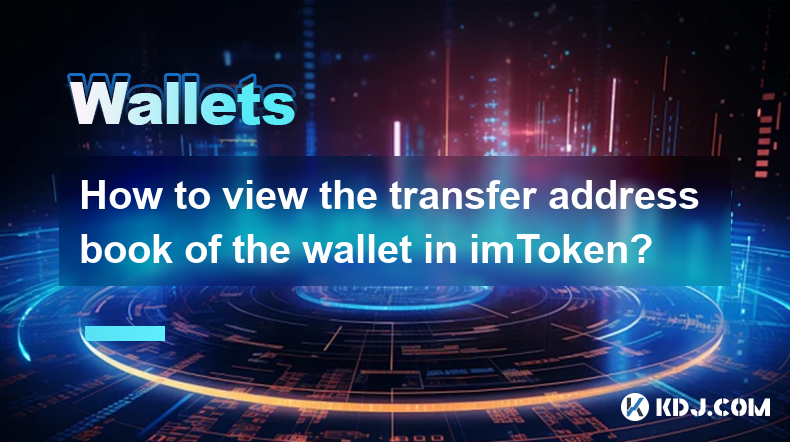
Key Points:
- imToken doesn't offer a centralized "address book" in the traditional sense. Instead, it manages addresses through transaction history and individual contact management.
- You can indirectly view addresses you've interacted with through your transaction history.
- Adding contacts within imToken provides a more organized way to manage frequently used addresses.
- Security considerations are paramount; never share your private keys or seed phrase with anyone.
How to View the Transfer Address Book of the Wallet in imToken?
imToken, like many other decentralized wallets, doesn't function with a readily accessible, centralized address book like a typical email client. The concept of an "address book" in the context of a crypto wallet is slightly different. Instead of a single, easily viewable list, addresses are managed through several methods within the app. Understanding these methods is crucial to managing your cryptocurrency transfers effectively.
Your transaction history within imToken serves as a de facto record of all addresses you've sent funds to or received funds from. This is the closest equivalent to an address book. To access this, navigate to your wallet's history. Each transaction displays the associated address, allowing you to review past interactions. However, this method lacks organization for frequently used addresses.
For better organization, imToken allows you to add contacts. This feature provides a more user-friendly way to manage addresses. You can label addresses with names (e.g., "John's ETH Address," "Binance Exchange"), making it easier to identify them later. This enhances security by reducing the chance of sending funds to the wrong address due to confusion.
To add a contact, locate the relevant address in your transaction history or manually input the address. You'll then be prompted to give it a name or label. Once saved, you can easily select this contact when sending future transactions. This method is significantly more efficient than sifting through your entire transaction history.
Remember that your private keys and seed phrase are the ultimate keys to your cryptocurrency. Never share these with anyone, under any circumstances. Compromising this information grants others complete control over your funds. imToken prioritizes security, but user responsibility is equally vital. Always verify the recipient's address carefully before confirming any transaction. Double-checking the address is a crucial step to avoid irreversible losses.
The absence of a single, consolidated address book within imToken is a feature, not a bug. This decentralized approach aligns with the core principles of blockchain technology and enhances security by preventing a single point of failure or vulnerability. While it requires a slightly different approach to managing addresses compared to traditional systems, the methods available provide sufficient functionality for most users.
Understanding the limitations of imToken's address management:
imToken does not have a feature to export or import your address book as a single file. This is intentional, prioritizing the security of your assets. Any such function would create a potential vulnerability. Your address book is essentially dispersed across your transaction history and your added contacts. This distributed nature is a security advantage.
Moreover, the address book in imToken is inherently linked to your specific wallet. If you create a new wallet, your previous contact list will not be transferred automatically. Each wallet operates independently, maintaining the integrity and security of individual cryptocurrency holdings.
The process of adding contacts is simple and straightforward, minimizing the effort involved in organizing frequently used addresses. However, the responsibility for maintaining an accurate and up-to-date list of contacts falls squarely on the user.
Frequently Asked Questions:
Q: Can I import an address book from another wallet into imToken?
A: No, imToken does not support importing address books from other wallets. Each wallet operates independently, prioritizing security. You will need to manually add each address as a contact within imToken.
Q: What happens if I delete a contact from my imToken address book?
A: Deleting a contact only removes the label and organization associated with that address. The address itself and its transaction history remain accessible through your overall transaction log.
Q: Is there a way to search within my transaction history to find specific addresses?
A: While imToken doesn't have a dedicated address search function, you can scroll through your transaction history or utilize the filtering options (if available) to locate transactions involving specific addresses. However, this may be time-consuming for extensive transaction histories.
Q: If I lose my phone, will I lose access to my address book?
A: Losing your phone doesn't directly delete your address book. Your contacts are associated with your wallet, but accessing them requires your private key or seed phrase. Securely backing up your seed phrase is crucial for regaining access to your wallet and its associated transaction history.
Q: Can I share my imToken address book with someone else?
A: Sharing your imToken "address book" (i.e., your transaction history and contact list) is not recommended. This would potentially expose sensitive information and compromise your security. Only share individual addresses with recipients on a need-to-know basis, always verifying their identity and the legitimacy of the transaction.
Disclaimer:info@kdj.com
The information provided is not trading advice. kdj.com does not assume any responsibility for any investments made based on the information provided in this article. Cryptocurrencies are highly volatile and it is highly recommended that you invest with caution after thorough research!
If you believe that the content used on this website infringes your copyright, please contact us immediately (info@kdj.com) and we will delete it promptly.
- Bitcoin price rejects the positive start to the week and reverts to negative returns
- 2025-03-29 02:40:12
- XRP Community Witnesses a Breakout Moment as Investor Enthusiasm for the $XPL Token
- 2025-03-29 02:40:12
- Add a brand-new Harry Potter Flying Car coin to your collection for FREE
- 2025-03-29 02:35:11
- RXS and XRP tokens are drawing attention, with XRP set for 5x returns and RXS potentially soaring 17,500%
- 2025-03-29 02:35:11
- Bitcoin (BTC) crashed below $84,000, down by over 5.5% from its highest point this week.
- 2025-03-29 02:30:12
- JasmyCoin (JASMY) at Risk of Binance Delisting: Executive Identifies Key Issue – What's Next for JASMY?
- 2025-03-29 02:30:12
Related knowledge
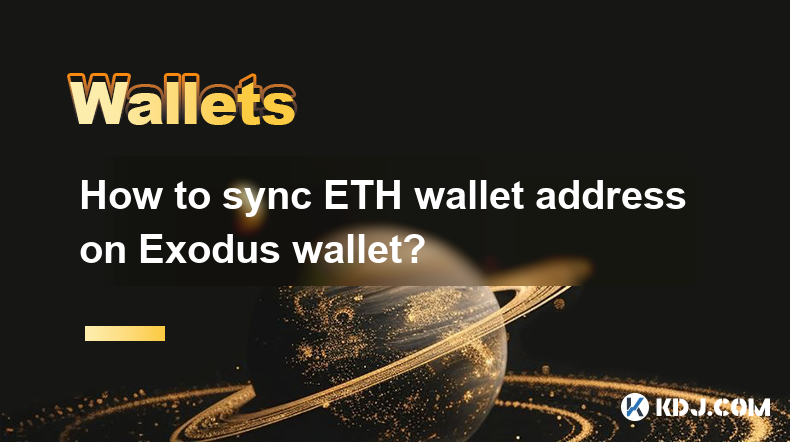
How to sync ETH wallet address on Exodus wallet?
Mar 29,2025 at 02:00am
Understanding Exodus Wallet and Ethereum IntegrationExodus is a popular multi-cryptocurrency wallet known for its user-friendly interface. It supports a wide range of cryptocurrencies, including Ethereum (ETH). Syncing your ETH wallet address within Exodus simply means ensuring your wallet is connected to the Ethereum blockchain and can display your ET...
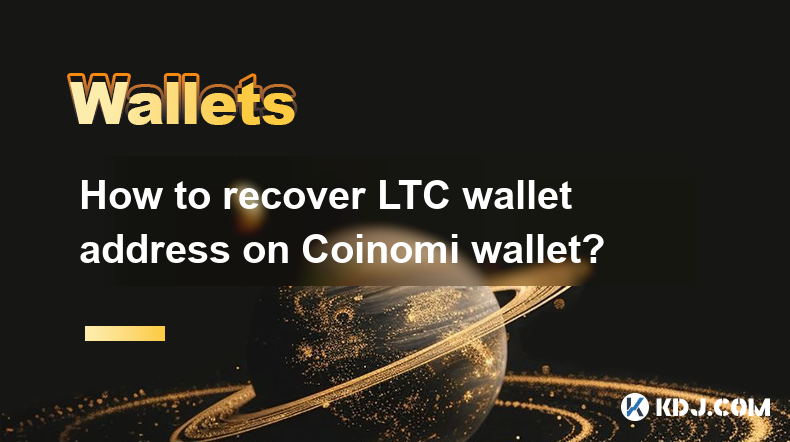
How to recover LTC wallet address on Coinomi wallet?
Mar 29,2025 at 01:35am
How to Recover Your Litecoin (LTC) Wallet Address on Coinomi Wallet Understanding Coinomi's Wallet Address SystemCoinomi is a multi-currency wallet, meaning it supports numerous cryptocurrencies, including Litecoin (LTC). Unlike some wallets that generate a new address for each transaction, Coinomi typically provides you with a single, primary LTC recei...
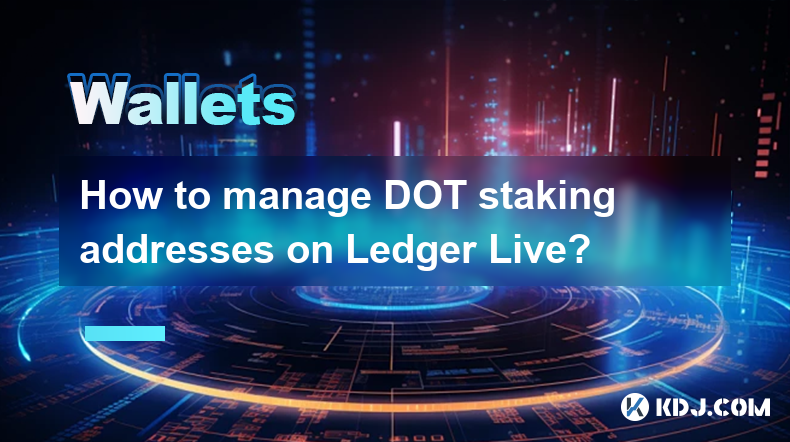
How to manage DOT staking addresses on Ledger Live?
Mar 29,2025 at 02:14am
Understanding DOT Staking and Ledger Live IntegrationPolkadot (DOT) staking allows users to lock up their DOT tokens to secure the network and earn rewards. Ledger Live, a user-friendly interface for managing Ledger hardware wallets, offers a convenient way to interact with your DOT holdings, including staking. However, it's crucial to understand that ...
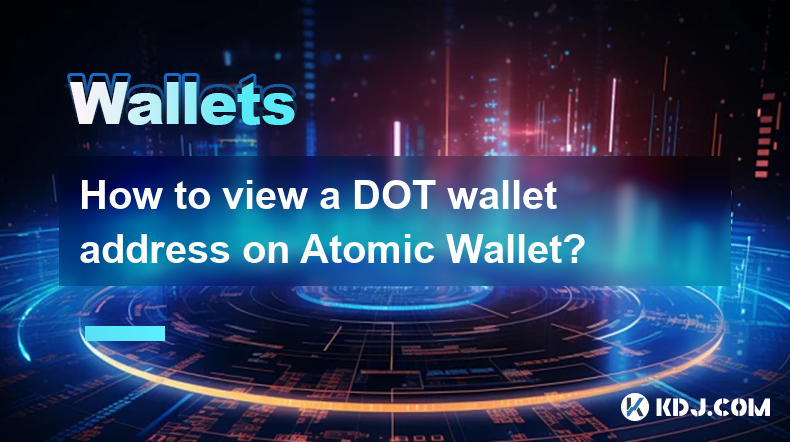
How to view a DOT wallet address on Atomic Wallet?
Mar 29,2025 at 01:50am
Locating Your Polkadot (DOT) Wallet Address in Atomic WalletAtomic Wallet is a popular multi-currency wallet that supports Polkadot (DOT). Finding your DOT address within the wallet is straightforward, but requires understanding the wallet's interface. This guide will walk you through the process step-by-step. Remember, your DOT address is crucial for ...
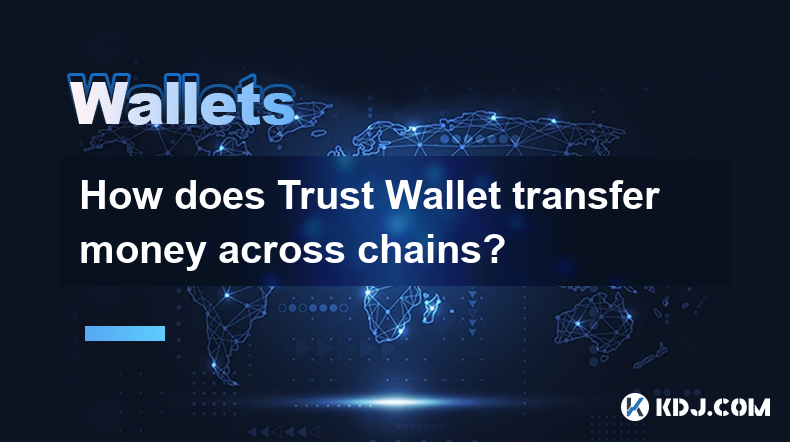
How does Trust Wallet transfer money across chains?
Mar 28,2025 at 10:49pm
Understanding Cross-Chain Transfers with Trust WalletTrust Wallet doesn't directly 'transfer money' in the traditional sense. Instead, it facilitates the movement of cryptocurrency assets between different blockchains. This process, known as a cross-chain transfer, involves several steps and often utilizes intermediary protocols or bridges. Understandi...
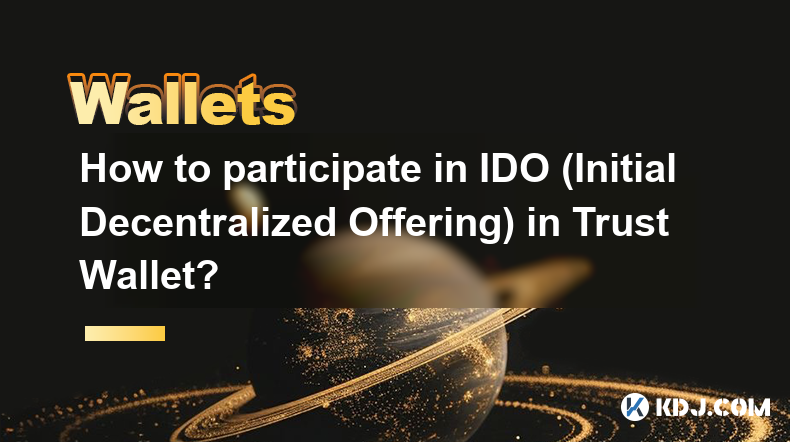
How to participate in IDO (Initial Decentralized Offering) in Trust Wallet?
Mar 28,2025 at 10:42pm
Understanding IDOs and Trust Wallet's RoleInitial Decentralized Offerings (IDOs) are a fundraising method used by cryptocurrency projects to raise capital. Unlike Initial Coin Offerings (ICOs), IDOs leverage decentralized exchanges (DEXs) to distribute tokens, often minimizing the risks associated with centralized platforms. Trust Wallet, a popular mob...

How to sync ETH wallet address on Exodus wallet?
Mar 29,2025 at 02:00am
Understanding Exodus Wallet and Ethereum IntegrationExodus is a popular multi-cryptocurrency wallet known for its user-friendly interface. It supports a wide range of cryptocurrencies, including Ethereum (ETH). Syncing your ETH wallet address within Exodus simply means ensuring your wallet is connected to the Ethereum blockchain and can display your ET...

How to recover LTC wallet address on Coinomi wallet?
Mar 29,2025 at 01:35am
How to Recover Your Litecoin (LTC) Wallet Address on Coinomi Wallet Understanding Coinomi's Wallet Address SystemCoinomi is a multi-currency wallet, meaning it supports numerous cryptocurrencies, including Litecoin (LTC). Unlike some wallets that generate a new address for each transaction, Coinomi typically provides you with a single, primary LTC recei...

How to manage DOT staking addresses on Ledger Live?
Mar 29,2025 at 02:14am
Understanding DOT Staking and Ledger Live IntegrationPolkadot (DOT) staking allows users to lock up their DOT tokens to secure the network and earn rewards. Ledger Live, a user-friendly interface for managing Ledger hardware wallets, offers a convenient way to interact with your DOT holdings, including staking. However, it's crucial to understand that ...

How to view a DOT wallet address on Atomic Wallet?
Mar 29,2025 at 01:50am
Locating Your Polkadot (DOT) Wallet Address in Atomic WalletAtomic Wallet is a popular multi-currency wallet that supports Polkadot (DOT). Finding your DOT address within the wallet is straightforward, but requires understanding the wallet's interface. This guide will walk you through the process step-by-step. Remember, your DOT address is crucial for ...

How does Trust Wallet transfer money across chains?
Mar 28,2025 at 10:49pm
Understanding Cross-Chain Transfers with Trust WalletTrust Wallet doesn't directly 'transfer money' in the traditional sense. Instead, it facilitates the movement of cryptocurrency assets between different blockchains. This process, known as a cross-chain transfer, involves several steps and often utilizes intermediary protocols or bridges. Understandi...

How to participate in IDO (Initial Decentralized Offering) in Trust Wallet?
Mar 28,2025 at 10:42pm
Understanding IDOs and Trust Wallet's RoleInitial Decentralized Offerings (IDOs) are a fundraising method used by cryptocurrency projects to raise capital. Unlike Initial Coin Offerings (ICOs), IDOs leverage decentralized exchanges (DEXs) to distribute tokens, often minimizing the risks associated with centralized platforms. Trust Wallet, a popular mob...
See all articles






















































































